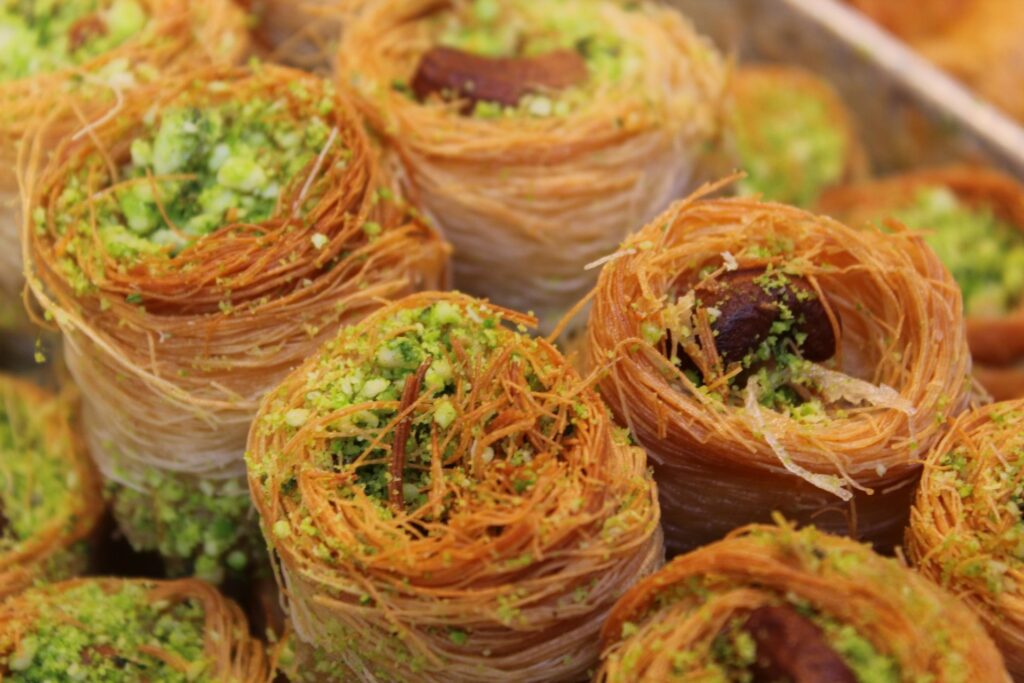
By Kate Robertson, Epicure & Culture Contributor
Israelis take great pride in being self-sufficient when it comes to food; no small feat for a country that is not much bigger than the state of New Jersey and is largely covered by desert. Israel’s various climatic zones allow a variety of products to be grown, from sub-tropical fruits like mangoes and bananas, to temperate crops like grapes, apples and cherries. In fact, Israelis have pioneered several foods that have become popular worldwide, including cherry tomatoes. Most crops are grown by collective settlements called kibbutzes.
If you’re planning a trip to Israel, here are some of the country’s best food markets. Each Israeli market has its own unique flavor and offers an array of colorful sights and delicious smells.
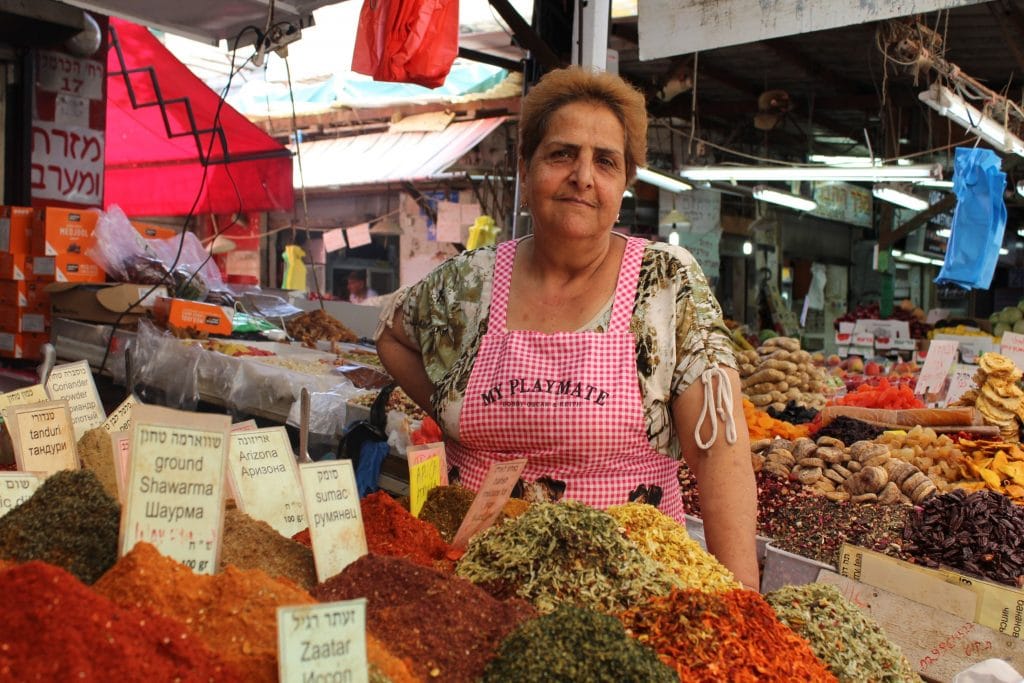
Carmel Market
Carmel Market in uber-modern Tel Aviv, the country’s economic capital, is the city’s best-known open air shopping area, located just a few blocks from the beach and close to the trendy Neveh Zedek quarter. Since Israel is a fairly young country, established only in 1948, immigrants have brought culinary influences from North Africa, the Middle East, the Mediterranean, Europe and Russia. Goods sold here reflect this hodgepodge of flavors.
The stalls at Carmel Market are loaded with brightly colored fruits and vegetables, aromatic spices, olives, teas sold in bulk, hand-made bread, confections and my favorite, baklava, a rich, sweet pastry made from layers of filo dough filled with chopped nuts and glued together with gooey syrup or honey.
You can also find cookware, household goods, clothing and jewelry. Each category is grouped into convenient sections, making shopping easier.
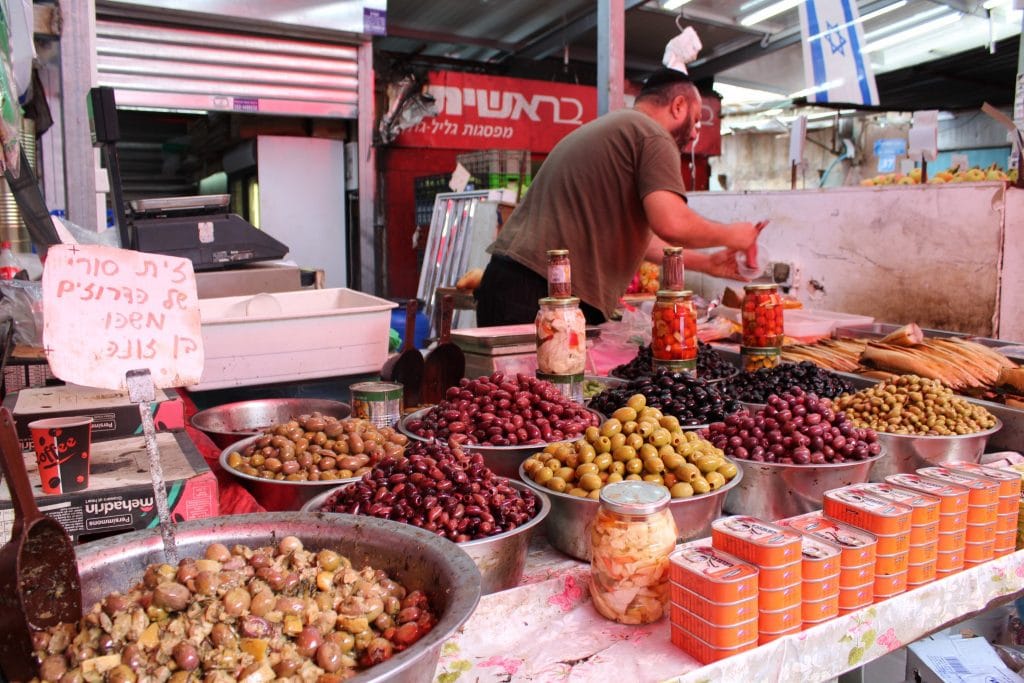
I decide my market visit cannot be complete without trying the regional specialty, a fresh antioxidant-rich pomegranate juice. I watch as the vendor chooses large ripe pomegranates, then slices and squeezes them with a special press until the glass is full. The sweet, tart flavor is deliciously refreshing!
Traveling to #Israel? Check out these #amazing #food #markets in #TelAviv and #Jerusalem. Click To Tweet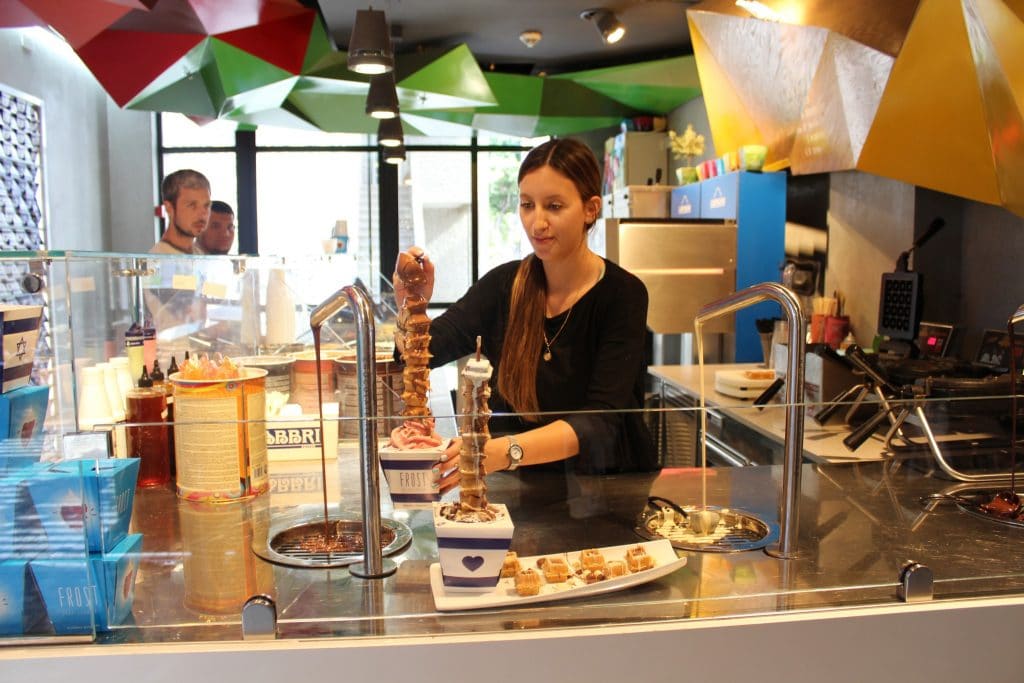
Sarona Market
If you prefer a modern market, Sarona Market in east Tel Aviv, just a few blocks from Rothschild Boulevard, is the place to go; though expect to pay more.
Sarona’s huge upscale food court, with its trendy interior design, houses restaurants run by some of the country’s finest chefs. You’ll also find shops selling local delicacies and imported specialties. There is a mix of traditional goods like olives, bread and vegetables, with modern inventions including locally-crafted beer and the ice cream waffle tower. I swear this treat was a foot high — and every inch was oh, so good!
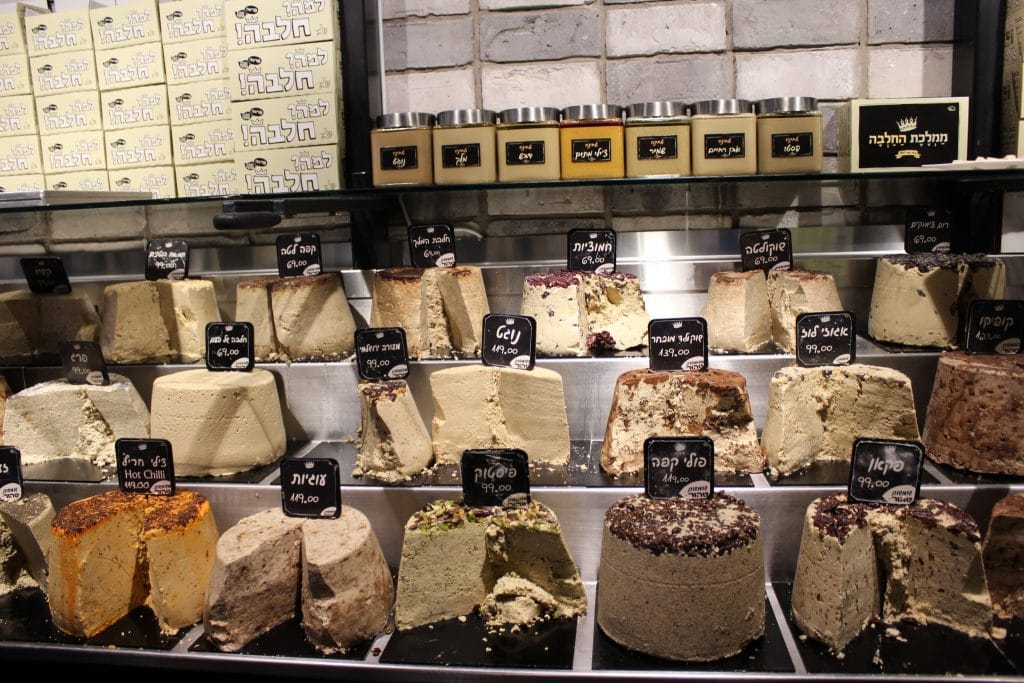
Here I come across a halvah-making machine. This honey-sweetened tahini (dry roasted sesame-seed butter) product looks like soft-fudge cake. Each form is perfect. I have to admit I’d only tasted packaged halvah before and did not like it, but I loved this fresh product with its dense, flaky texture and nutty sweetness.
If you #love #street #markets, you must head to #Israel. Here's why. Click To Tweet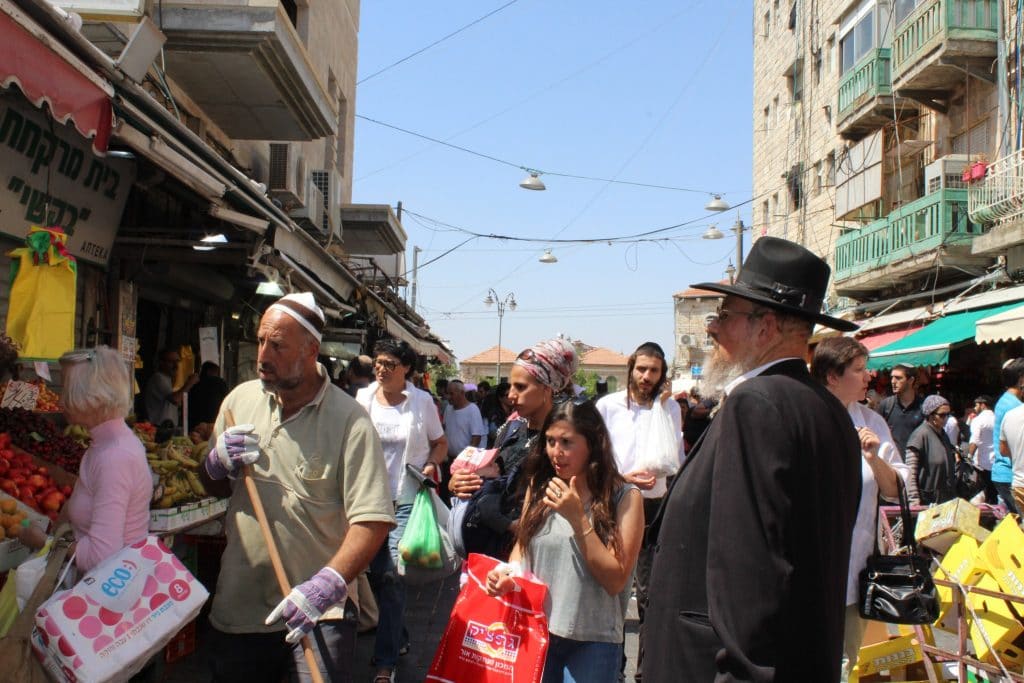
Machane Yehuda Market
In Jerusalem, Israel’s capital city and one of the oldest cities in the world, you will find Machane Yehuda, also called the Shuk (Arabic for market). This market, which dates back to the Ottoman period, has both open air and closed sections. It is both a market and neighborhood, filled with the regular food stalls and shops, restaurants and bars, and lots of tiny fast-food cafes. Tip: try the shawarma: shaved turkey meat basted with lamb drippings, stuffed into a pita bread with veggies, pickles and French fries.
The Shuk is normally a hive of activity, especially on Friday afternoons before it closes for the Shabbat. I highly recommend taking a tour and audio guide as the market is easy to get lost in! There are also various tours stopping at vendors for explanations and tastings — like the Market Tasting Tour and Beyond The Walls of Jerusalem Tour. Alternatively you can buy a Machane Yehuda Bite Card, six coupons which have been curated to give you a chance to try a variety of products without having to join a tour.
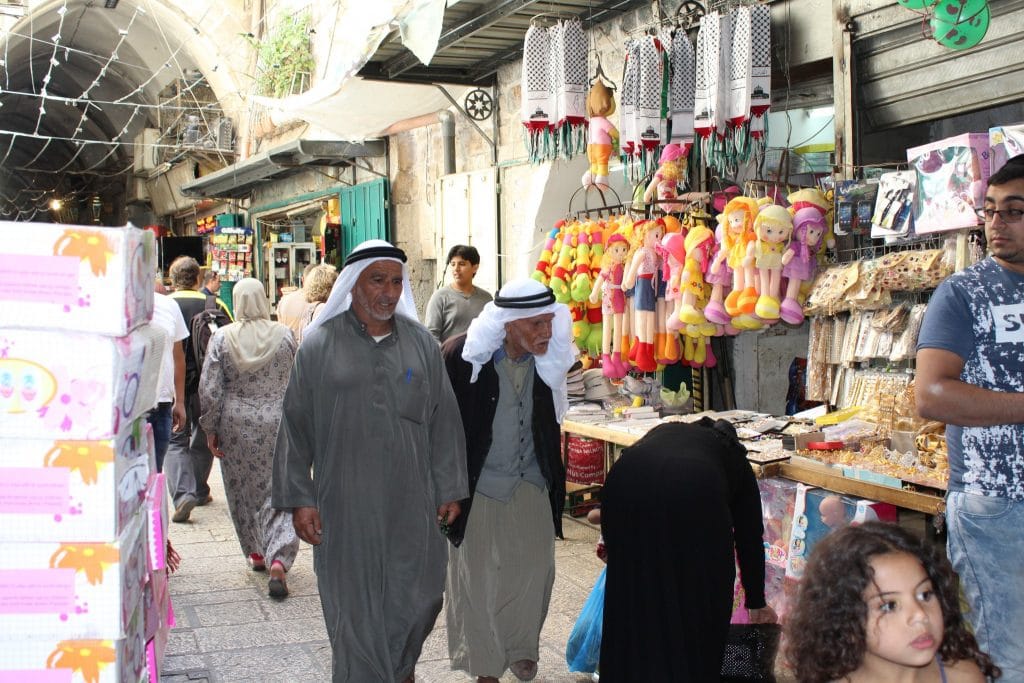
Jerusalem is far more conservative than Tel Aviv. With fewer secular Jews living in the old city, there are more Kosher restaurants — which display a Kosher certificate — and Orthodox Jews dressed in their black garb and big hats.
In Jerusalem, I learn that dairy and meat cannot be eaten together, and only the meat from cud-chewing animals with cloven hooves can be eaten, just to name a few Kosher restrictions. In many fast-food places you’ll also find prayer cards in paper holders. It is common to see diners picking them up and starting to chant an after-meal prayer.
Old City Jerusalem Shuk
The old walled city of Jerusalem is divided into quarters: Armenian, Christian, Jewish and Muslim/Arabic, each with its own unique atmosphere. This is where the famous Mount Temple and the Church of Holy Sepulchre — the place where Jesus was crucified, buried and resurrected from — are found. It’s also here that the Via Dolorosa (painful way) is located; the route Jesus walked to his crucifixion. Millions of tourists visit this place each year.
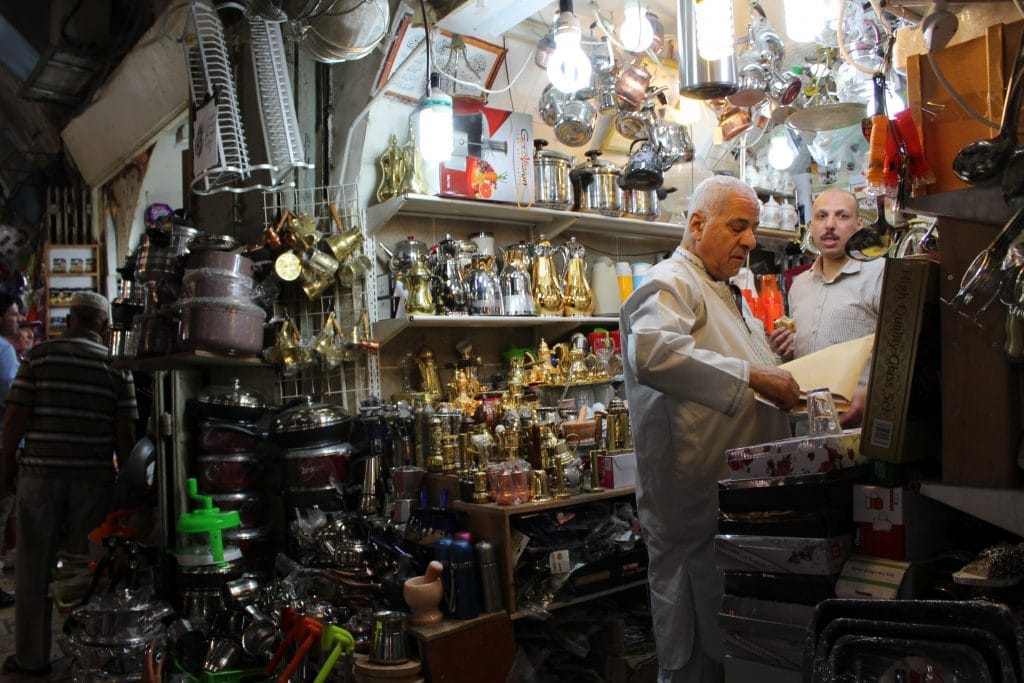
Like an ancient shopping mall, the Old City Jerusalem Shuk zigzags down narrow stone alleyways, with vendors mostly selling religious paraphernalia and souvenirs. When you get to the Arabic quarter, where the streets are busier and many men wear traditional Arabic garb, you’ll find vendors selling everything; from beautiful Arabic bronze plates to jewelry, scarves and glass blown by local Bedouin tribes. Be prepared to practice your haggling skills, as you are expected to negotiate a final price.
If you love markets as much as I do, Israel will not disappoint. And if you decide to partake in all of the delicious food there is to be had at these markets, afterward you can enjoy some of the best hikes in Israel to burn off the calories!
Travel Tip: Because the majority of Israelis are Jewish, the religious day of Shabbat is celebrated in many places, meaning that businesses are often closed on Saturdays. This includes Carmel Market and Machane Yehuda, so plan accordingly.
Recommended Israel Food Tours:
Beyond The Walls Of Jerusalem Tour With Market Visit & Tasting [Jerusalem]
Central Israel Wine Tour From Tel Aviv [Tel Aviv]
5-Day Vegetarian Cooking Tour of Israel [Tel Aviv]
Have you ever visited an Israeli market? Share your experience in the comments below!
Kate Robertson
Latest posts by Kate Robertson (see all)
- How To Indulge In Turkey’s Delicious Culinary Culture - Jan 11, 2018
- How To Have A Sustainable (And Fun!) Trip In Charlottetown, Canada - Oct 9, 2017
- How To Help The Planet By Drinking Icewine - May 24, 2017
- How To Explore Phoenix’s Sustainable Food Culture - Apr 17, 2017
- Why Cape Breton Island Has the Most Delicious Lobster In The World - Jan 9, 2017

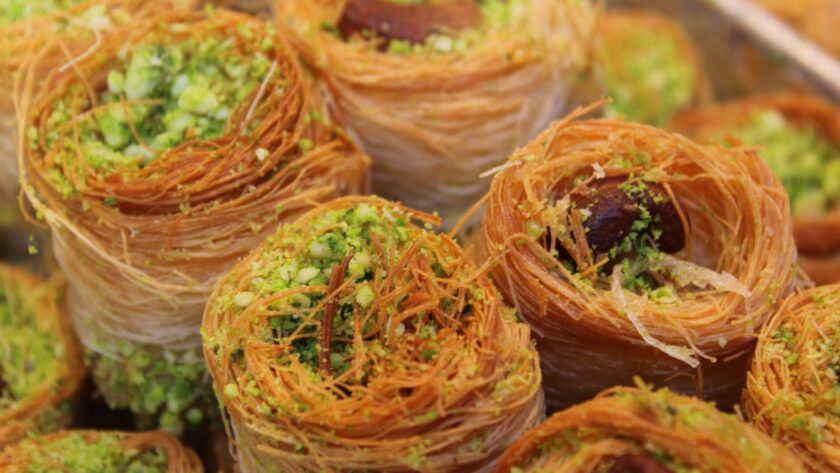
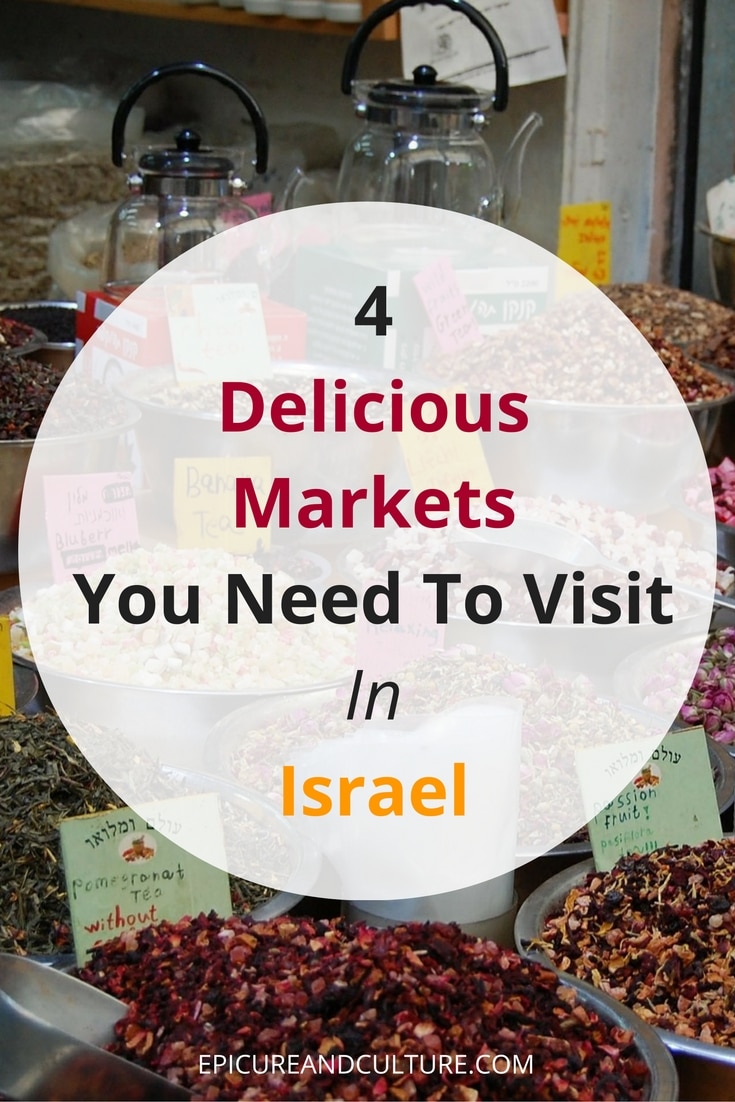
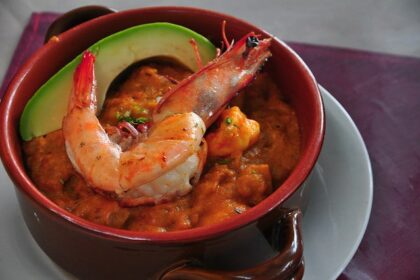
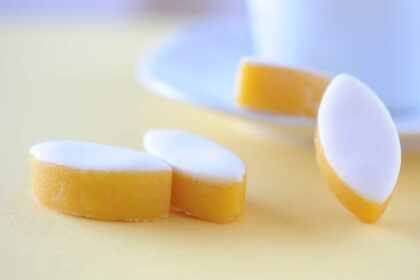

Very great. Didn’t find here about Shuk Hapishpishim in Tel Aviv. It one of the famous markets in Israel
It’s great that you advised. I will try to visit these markets in Israel. Thank you!
Hi Tori, glad you enjoyed the article. Enjoy the markets!